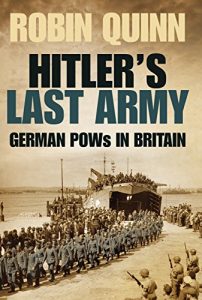400,000 GERMAN TROOPS ON BRITISH SOIL!
In 1940, when Adolf Hitler planned to invade Britain, his greatest wish was to read a headline like this. Yet, five years later, there really were 400,000 German servicemen in the UK – not as conquerors but as prisoners of war. They were, in every sense, Hitler’s Last Army.
Using exclusive interviews with former prisoners, as well as extensive archive material, this book looks at the Second World War from a fresh perspective – that of Britain’s German prisoners: from the shock of being captured to their final release long after the war had ended.
‘Being taken prisoner was for the other side, not us,’ one man remembers. ‘A strange new existence was about to begin,’ another says. ‘We were in a kind of limbo, a vacuum between the old life and whatever the future held.’ Britain used the prisoners to provide essential labour, especially on farms. In time, friendships were forged between former enemies. ‘We met the farmers, we met English people and liked them as human beings,’ says one German ex-soldier. ‘We didn’t want to let the farmers down so we worked hard.’
Some POWs fell in love with British women, although such relationships were often condemned: ‘Falling pregnant outside marriage was bad enough – but with a German POW!’
In 1940, when Adolf Hitler planned to invade Britain, his greatest wish was to read a headline like this. Yet, five years later, there really were 400,000 German servicemen in the UK – not as conquerors but as prisoners of war. They were, in every sense, Hitler’s Last Army.
Using exclusive interviews with former prisoners, as well as extensive archive material, this book looks at the Second World War from a fresh perspective – that of Britain’s German prisoners: from the shock of being captured to their final release long after the war had ended.
‘Being taken prisoner was for the other side, not us,’ one man remembers. ‘A strange new existence was about to begin,’ another says. ‘We were in a kind of limbo, a vacuum between the old life and whatever the future held.’ Britain used the prisoners to provide essential labour, especially on farms. In time, friendships were forged between former enemies. ‘We met the farmers, we met English people and liked them as human beings,’ says one German ex-soldier. ‘We didn’t want to let the farmers down so we worked hard.’
Some POWs fell in love with British women, although such relationships were often condemned: ‘Falling pregnant outside marriage was bad enough – but with a German POW!’






